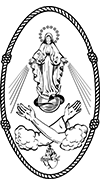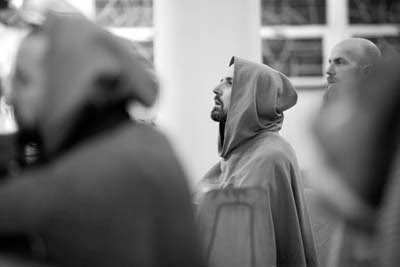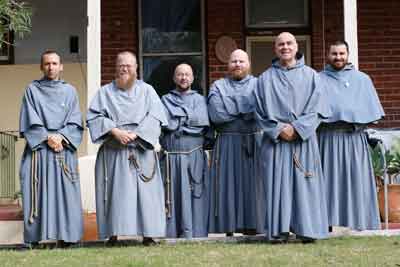What is a Vocation?
Saying Yes to GodWhat is your vocation?
What is your vocation?
Young people every now then will hear this question put to them in one form or another. Almost every time it seems to catch them by surprise and they feel some embarrassment about answering. They quickly realize that it is a serious question, but usually, they do not know what to answer, and they try to dodge the issue by an evasive “Who knows? … I will think it over … I will see later on.”
They may never have seriously reflected on the word “vocation”, and on hearing the term put to them this way unexpectedly, the sound of it seems almost strange and mysterious.
What does vocation mean?
It comes from the Latin “vocare”, meaning to “call”… Thus we say that every vocation is a call addressed to man.
From whom does this call come?
It comes from God, who is the Master of man’s life and man’s death.
It is God who gives us being and causes us to continue to be, so that “in Him we live and move and have our being” (Acts 17:28).
What does God call us to?
God calls, first, every person into human existence. Then, He calls him to carry out some mission in his life whereby he is to grow in holiness and in this way to earn Paradise.
St. Ignatius of Loyola beautifully set forth the doctrine: “Man was created to give praise, homage and service to God, Our Lord, and in this way to save his soul. Other things that are on the face of the earth were created for man to help him achieve the end for which he was created.”
This call to human existence and to holiness is the vocation of all— of every man that is born into this world.
But the “call” to gain holiness by fulfilling one’s God-given mission during the course of his earthly sojourn determines the right state of life for each individual to adopt. Thus, one who perceives that he is called to matrimony, has the vocation to marry and must live in the state of matrimony. One who perceives he is called to the priesthood must carry out his vocation in the priestly state. Someone finding himself called to the consecrated life, must respond by embracing the religious state. One who finds he is called to missionary life, must make his life that of a missionary .
One can also consider “vocation”, in its broadest sense, as a call to one of the professions or other human careers, especially the career of those who, without consecrating themselves to God, remain unmarried, completely and exclusively dedicating themselves to the occupation of physician, teacher, artist, farmer, mechanic, etc.
Each boy and girl has his own particular “vocation” to fulfill in life, the vocation assigned to him as his way to reach the Kingdom of Heaven. Everybody has a call from God to which he is expected to respond, so as to faithfully fulfill it in order to attain salvation.
The task of determining what is one’s true vocation is certainly not something one does with effortless ease. But one must do it, because it is something bearing on everyone’s temporal and eternal destiny.
With a fatherly wisdom Pope John Paul II warns us, “Everybody, especially if he is young, must intelligently ask himself the fundamental question about Christian life: ’What is it that God calls me to? ‘“
There are perhaps many who do not ask themselves this “fundamental question” at all, who, as they live from day to day, trust to luck it out (so to speak) and venture ahead haphazardly with frightening thoughtlessness.
How many are there, for example, who, before getting married, had reflected on St. Paul’s teaching that one who, following his vocation, picks the married state, “does well”, but he who is not so called and for God’s sake does not choose to marry, “does better” (I Cor. 7:38)? How many persons, who are engaged or married, were interested in determining whether God favored them with something “better” (in itself), namely, the consecrated vocation, instead of something merely “good”, namely, the vocation to marriage?
It may happen one day not far away, that they find themselves committed to an unmeaningful life and will be painfully prompted to ask themselves too late what God truly wanted of them. They will be like that good old lady making a voyage who, out in the middle of the Atlantic, finally asked an officer of the vessel, “Excuse me, Sir. Is this the right ship to take for America?”
How many bitter regrets are heard from people whose sad mistake was that of choosing their path without due consideration beforehand! How many lives are ruined because people have neglected to ask themselves that “fundamental question” at a suitable time! Seneca shrewdly declared that for very many men it is true that they “spoil one part of their lives by doing evil; they spoil a greater part it by doing nothing; and they spoil the rest of it doing everything but what they should do.” That is why St. Alphonsus, citing in one of his books, Fr. Granada, who described choice of a state of life as the “chief wheel of our whole life”, adds this wise comment: “As with a watch, when the master wheel is broken, the whole watch ceases to function, so in the order of our salvation, when the choice of a state in life is mistaken, the entire life is mistaken.”
Let every boy and girl seriously reflect on this exhortation of St. Paul: “I beseech you, brethren … be not conformed to this world”—be not worldly-minded; “but be reformed in the newness of your mind, that you may prove what is the good and the acceptable and the perfect will of God” (Rom. 12:1–2).
We must take care, then, to ask and answer the “fundamental question” that will enable us to live a life leading us to the Kingdom of Heaven, according to the state—whatever it be—that God has determined for us. St. Augustine wrote very meaningfully, “We are living our life in vain if we are not using it to earn eternal life.”
The example of St. Francis Xavier, a brilliant student at Paris, is one to remember. His ambition was to restore his noble family to its former greatness. He lived only for this. One day he met St. Ignatius Loyola, who became his roommate and classmate. From St. Ignatius young Francis heard again and again these powerful words of the Gospel, “what does it profit a man to gain the whole world, and suffer the loss of his own soul?” (Mt. 16:26). At first these words left little impression on Francis. But little by little, they penetrated his heart and moved him to decide to repudiate the world with all its lures and choose God. Instead of seeking the restoration of his family, he dedicated himself to building the Kingdom of God in the souls of the faithful, as he toiled with incredible zeal in far-away Asia. He became the heavenly Patron of Catholic Missions in the Orient.
Young people who read this, consider yourselves. Do not be dazzled by the lure of creatures or by thoughtless impulses and feelings. Look ahead, look to the far future, think of eternity. “What does it profit a man to gain the whole world, and then suffer the loss of his own soul?” (Mt. 16:26) One indication you have of a calling is to appreciate the value of the soul you must save and sanctify, by going wherever you could best be assured your spiritual life would grow and mature to the full stature of Christ (cf. Eph. 4:13).





